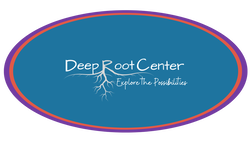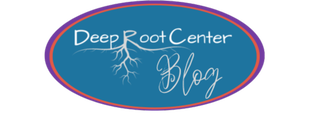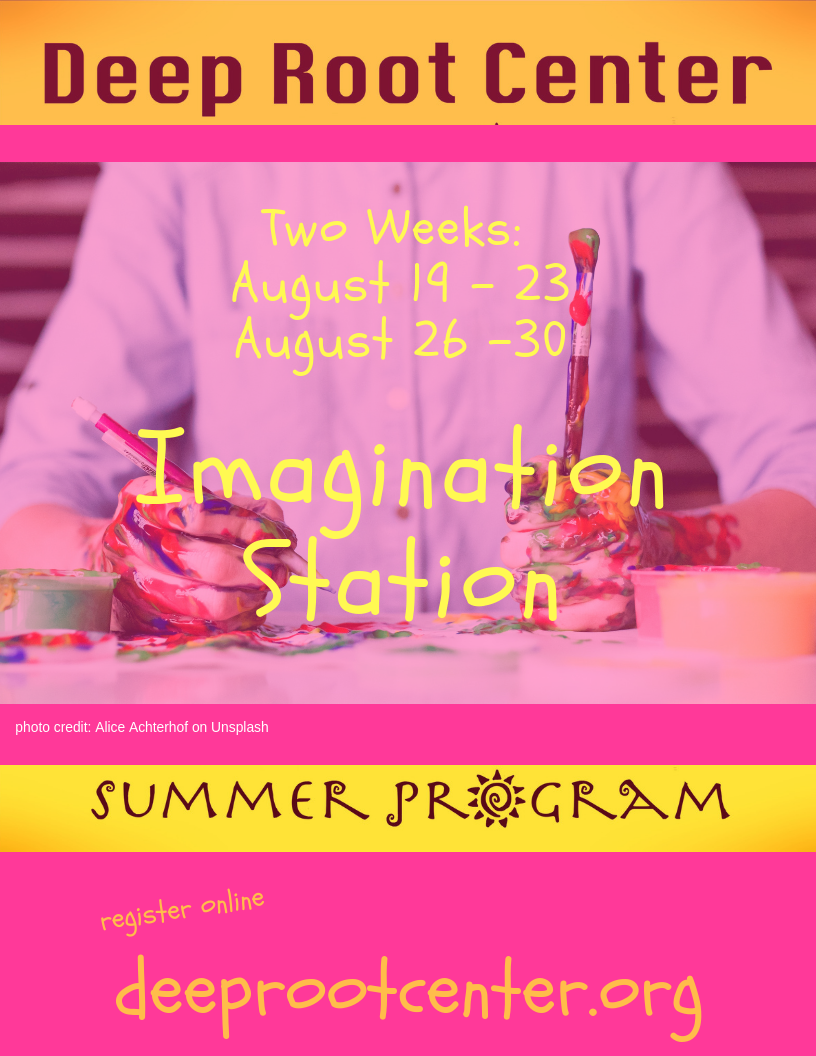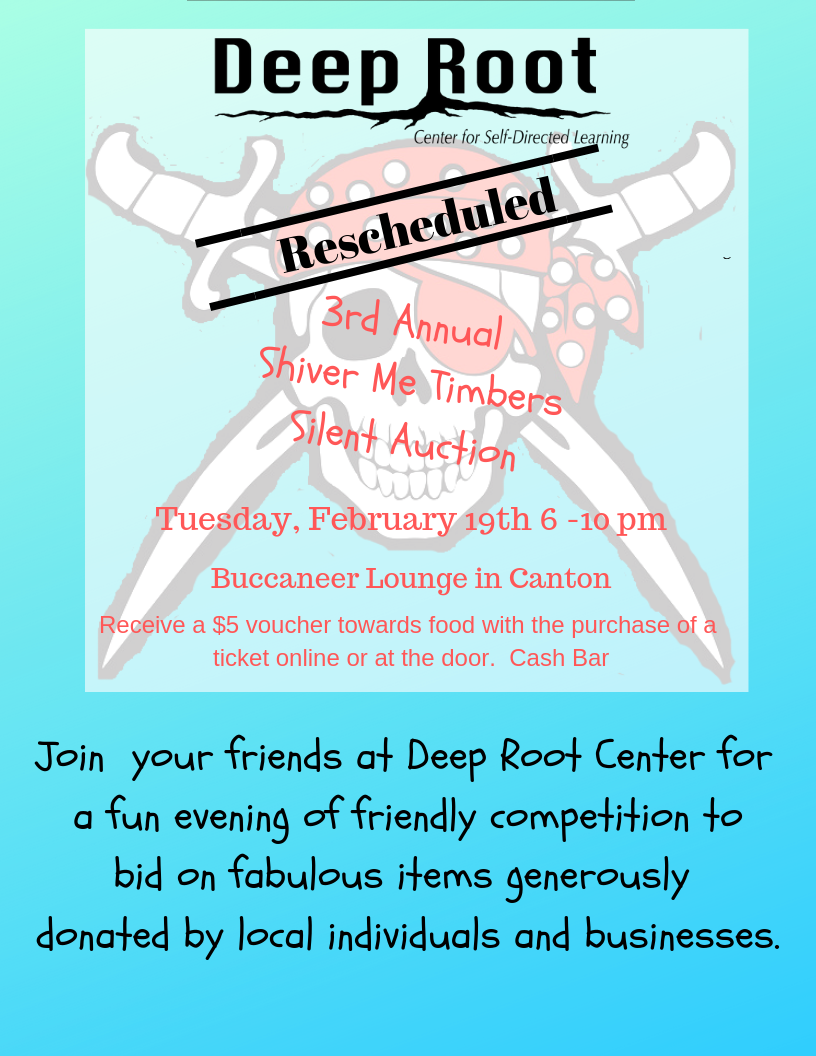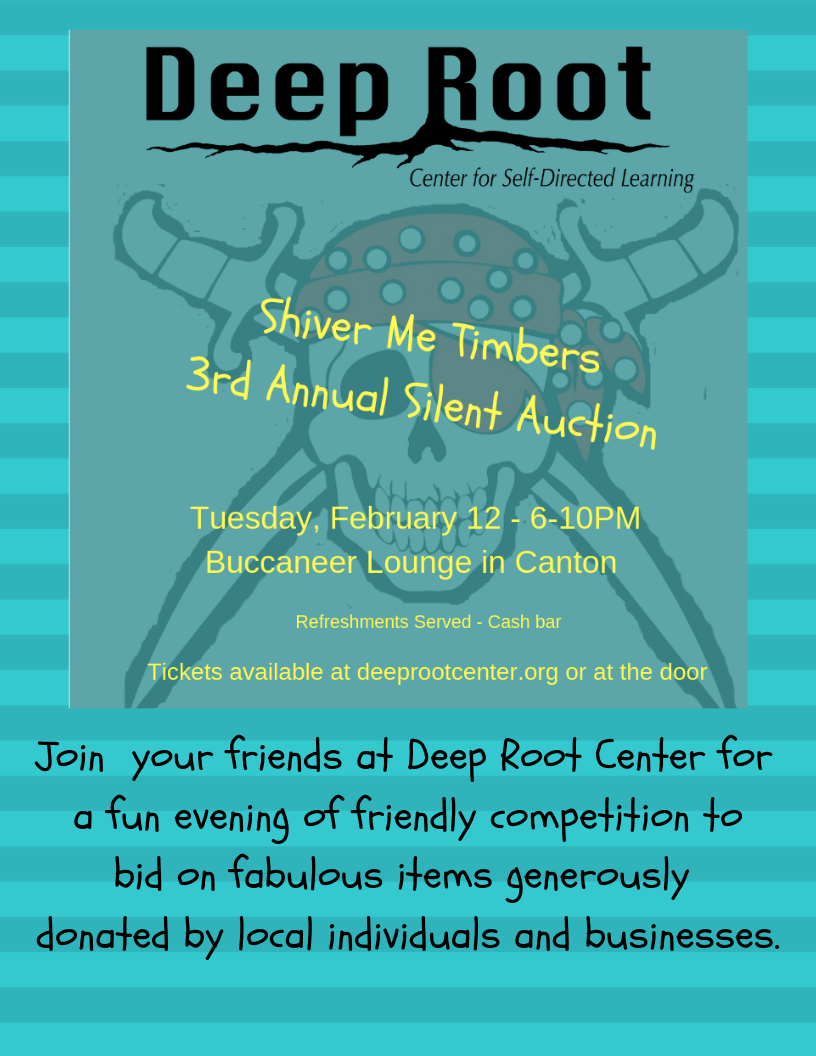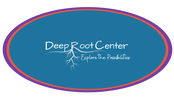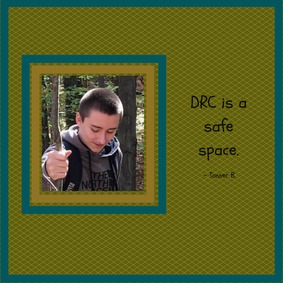 Beyond open, non-coercive, and non-compulsory, the word I use most often to describe the DRC environment is “safe.” Our student members are safe from bullying and manipulation, on all levels - from physical to emotional. I can make that promise when they are here; however, as we recently discovered, I cannot, when they go out into that competitive world where, some people use retaliation, cruelty, and vindictiveness, to “win” life. Some would say, “but, how is that helping them, won’t they expect to be protected everywhere? You can’t shield them from reality.” That isn’t the point! So often, kids unintentionally present themselves as targets because they feel inferior, defeated, or just plain sad. They emit an unconscious signal of vulnerability and defenselessness to those who will, without a second thought, take advantage of their personally perceived victim-hood. The DRC environment is filled with staff and volunteers who genuinely care. Not only do we model self-assurance, self-motivation, humor, and ability to be our true selves, we also meet everyone here with empathy, respect, and thoughtfulness. In our role as mentors, we guide each student to be assertive yet kind, personally motivated yet unselfish, strong yet flexible, influential and inspiring yet humble, curious yet attentive, imaginative yet honest, and above all we encourage them to be gentle, trusting spirits without becoming vulnerable targets. In doing so, we are teaching them to respond to bullying with a calm, poised demeanor – to walk away from any maliciously inspired conflict with confidence, as well as compassion, instead of wallowing in self-pity, berating themselves, and blaming others for their feelings of inadequacy. In guaranteeing safety, we are pledging that DRC is the place where kids can learn how to be their best, most authentic selves by making mistakes and exploring all the world has to offer without dealing with people who don’t have their best interest in mind. Then with those new-found skills and confidence levels, they can boldly venture beyond their carefully cultivated comfort zone to discover what they can offer to their community, as well as the wider world. DRC News Thank you to everyone who came out to the DRC Silent Auction this past Tuesday. It was a tremendous success and a ton of fun. We are grateful to everyone who donated goods and services. Please check out the page on the website to see all of the donors. Summer Programming!
Yes! Believe it or not, summer is just around the corner. We are developing some cool collaborations and ideas for these last two weeks of summer, including an hour of yoga with Kelly Newman Burnham each day. Stay tuned! Register online here.
0 Comments
Mistakes are the foundation of all learning opportunities. It is completely unrealistic to believe that any of us will make it through a single day without screwing up at least once. The definition of experimentation is making mistakes until you find the solution for that particular scenario. There are major blunders, which at the time, feel insurmountable, and there are others, as Bob Ross so famously, and patiently, pointed out, that are “just happy little accidents.” When I hear, during a mentoring session, or even a casual conversation, that someone suffers from the fear of making mistakes, I go on high alert. The usual justification for their phobia is that they will look conspicuously inferior, childish, or utterly ridiculous, and someone will probably yell at them. This usually means that not only do they dread them, they will go out of their way to fabricate stories to explain to themselves and others why something happened. These tales often involve placing blame on someone else. After a while this pattern becomes such a habit, that even they can’t distinguish between what is real and what they have made up. It becomes a vicious cycle of burying the dislike for oneself, by making excuses for failure, while holding onto reasons to dislike the person or circumstance they are accusing. I will be the first to admit that over this life-time a good proportion of my errors have fallen closer to the massively horrible end of the scale rather than the adorably cute, little mishap side. Overwhelming doesn’t begin to describe that heart stopping, gut wrenching, over the top feeling of hopelessness when you realize what you have done. The first instinct is to hide in shame and find someone or something to blame is hard to resist, until you remind yourself, in that stern inner voice you reserve for these particular occasions, that you are human. Your job is to make mistakes and learn from them. The first step is to own it. Stand up and declare, woah, I seriously f**ked that up! The next step is to sit with it, be patient with yourself, examine all the deep, dark corners, which can then, and only then, be followed by reparation to whomever may have been hurt by your actions, including yourself. Fix whatever needs to be mended, whatever that requires, and then, most importantly forgive yourself and move on, more enlightened than you were before. Taking responsibility for the errors – all of them - using them as stepping stones - is not only healthy for the process of growing as a human being, it is essential for building positive relationships. How, then, do we teach young people that making mistakes is actually the most important part of their education? What can we say for them to believe: there is nothing to fear, it is OK to mess up, and we actually expect it to happen pretty frequently, when they have already learned from other places and people that the opposite is true? What monumentally seismic, internal shift has to occur before they can comprehend and let themselves off the hook? Providing a safe, caring environment filled with a supportive community probably tops the list of external conditions. However, is that enough? What else do they need to shake that all-consuming fear? Considering that changing societies rigid standards for perfection is a bit beyond our scope of influence, the best we can do is offer unconditional love, reassurance, encouragement, and transparency, by modeling the exercise of taking responsibility. We expect our students to take charge of their lives and education – when, fear instead of curiosity drives that process – the decisions they make are safe ones with no margin for error, or, for that matter, growth. Learning to fly without the net is essential. Go - Jump, Leap, Dive into your next adventure. We expect you to make mistakes, but remember, as long as there was no malicious intent, we are here to help you own it, without judgement, and assist in cleaning up the mess. DRC News
(Yup, the title is a nod to the inspirational T.T.) This is a seemingly valid question for an educational organization. What exactly does love have to do with learning? In a word - everything! Research, as well as anecdotal evidence shows that when caring, kindness, compassion, giving, receiving, respect, trust (as highlighted in last week’s blog), empathy, and appreciation are not only present, but actively modeled, they serve to tear open the sealed off and scabbed over internal place, in each student, where an innate desire to learn then has the opportunity to take up residence. At DRC, we don’t need endless studies to tell us that providing an environment filled with affirmation and genuine affection, along with an endless supply of open-ended opportunities for exploration and discovery is required to instigate the natural curiosity needed to unearth deeply buried passion and aspirations. We witness this phenomenon in a myriad of small ways that bring along moments of both euphoria, as well as intense pain, which show up as points of excitement and crisis, in the midst of all the other happenings every single day, and take an enormous amount of energy to manage. Even though we have a specific time set aside for each of the older students (12-19 yr olds) to meet with their mentor (me) every week as the formal place for them to share their vision of the future, brainstorm ideas for ways to explore their interests and passions, talk about the things that worry them, discuss ways to move forward when they are stuck, get help putting together a portfolio and transcript, and set goals, both incremental and life vision - we find that these individual sessions are actually an infinitesimal piece of the mentoring program. In DRC’s multi-age, and open environment, students are surrounded by all those diverse discussions and activities that spontaneously crop up all day long, as exhibited below. At any given point during the day, there are usually between five-eight kids and at least one, if not two, adults standing around the kitchen island – making food, eating, listening to music, looking stuff up on their phones, and sharing stories. I have realized over the past couple of years that DRC actually replicates the practice of the family dinner, which has been documented as one of the most important factors in raising happy, well-adjusted children, who are able to relate to others in positive ways because they have learned by developing real relationships with their parents and siblings. Yes, we are family. One that is authentic, dynamic, and constantly changing – breathing in and out with a life of its own. The new ten-year-old student, who is totally surprised that I didn’t call him out for goofing off in the chill-space. The two new teen cousins who throw clay at the art table for hours on end and “mop” the floor as only two teenage boys can. The thirteen-year-old who spends most of his time in the basement shop and asks for $3 from the petty cash fund to go to the thrift store to purchase a couple of jackknifes so he can work on a yet to be defined project. The fifteen-year-old who tells me that she thinks she wants to become a baker so I contact two local bakeries to set up interviews. The same teen who returns from visiting a friend at SUNY Canton for lunch with a huge grin on her face exclaiming that she is definitely going to college, probably next year. The thirteen-year-old, who has not previously used DRC in a meaningful way, asks me to do his mentoring session in the music room to listen to him play the three songs that he has written at home and asks me to help him figure out how to record them. The genuinely talented teen who is trying to figure out exactly who she is and speaks of the permanent mask she wears. The eight-year-old who has discovered a passion for cooking and makes amazing sausage and gravy one day and mashed potatoes the next. The eighteen-year-old, who indulgently, and ever so patiently, takes on the role of Uncle C., as the others have labeled him, writes his name in Runes on his arm with pen and spends every free moment researching Viking History and super-heroes, and developing costumes and props for cos-play. The fourteen-year-old who was deathly afraid of reptiles, but held a lizard on his chest during a presentation and later proclaimed how proud he was of himself. The tween who is in the middle of intense family crisis and requires unlimited emotional support. The young child who draws amazing characters from cartoons and tells the stories of the world he has made up where they all live together with him. The two teens who work through hurtful comments and behaviors, discovered by one of them, in an emotionally charged confrontation that could have ended disastrously, but instead became a time that they were both proud of themselves. The teen who experiences moments of extreme anxiety and leaves the Center for a short-time to walk it off. The six-year-old who weaves his way through our space watching and listening intently, all the while bouncing on his toes and fidgeting with a toy in his hands and then heads to the music room to figure out how to play the keyboard and guitar at the same time. The fifteen-year-old, who sits in the chill space with headphones firmly planted over his ears, listening to music and watching random You-Tube videos, and one day presents two of those videos (each 20 minutes long - one motivational, the other about music theory) during a mentoring session, with a detailed explanation that proves without a doubt this kid is indeed going to be better than OK. The teen who hides his brilliance in his sketchbooks and is afraid to share his talent with anyone. We have discovered that providing this space, this caring, supportive, respectful community, where all of that and more can happen, requires not only an abundance of time and energy, but an intuitive, natural skill-set that cannot necessarily be taught through an official or even traditional professional program. Loving and mentoring these kids requires listening to, and understanding, their stories - the traumas, big and small, all the experiences throughout their childhoods that have shaped who they are. In addition, we do all this without feeling sorry for them or allowing them to use those experiences as excuses for not moving forward in a positive direction. This is mentoring in its rawest form. It is gritty and real. There are equal moments of heartbreak and elation. It is definitely not for the faint of heart or for anyone who expects that they can control any situation by simply making rules. This is all about love – pure and simple. DRC News
Silent Auction We are assessing the forecast for Tuesday. There is currently a winter weather watch posted. We may decide to reschedule. You can keep track of all the amazing items on the website. We will keep you updated, as decisions are made. Thank you! 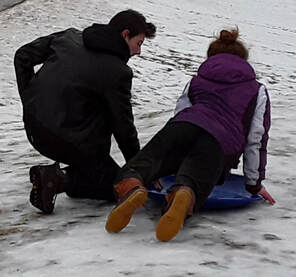 In a world driven by competition, criticism, and, yes, distrust, an open environment where everything is built on, the antithesis - trust, kindness, and respect - is utterly foreign to all who enter. Culture shock is not an uncommon reaction for those who chose to stay. The people who invite those initial and inevitable sensations of unease, disquiet, and disorientation to erupt, and be dealt with, go on to thrive. We have discovered that the folks who resist and try to bury those feelings, surrender to the discomfort, before they have a chance to assimilate, and often return to the familiar world that they had sought to escape in the first place. To be trusted involves the unshakable, persistent, overwhelming belief that:
At Deep Root Center, we believe all of those things about every single person who joins us. And, we expect that over a period of time, with encouragement and compassion, our students will come to trust themselves, too. Because, at the end of the day, without trust, self-directed education, intrinsic motivation, and the innate desire to learn will not survive. I freely admit, there are moments that I struggle, mightily, to hold onto this foundational belief, especially over the past two months, or so, when we were dealing with some pretty big “stuff,” which adversely affected the entire community. This is when I actually said, on two separate occasions, “I will always trust you, until given a reason not to.” Holy Hell - seriously - those words came out of my mouth? What about, you get to make mistakes and learn from them? What about the very first point, everyone deserves to be trusted? No wonder, there has been discord! I now realize that those words spoken in moments of pure, unadulterated frustration have had a negative impact all on their own. Because, “Without trust, self-directed education, intrinsic motivation, and the fundamental desire to learn will not survive.” This is the moment that I can (need to) use that intersection, where mistakes, profound realizations, and apologizes meet, to begin to rebuild a couple of relationships. I firmly believe that the cornerstone of respect we hold for each other will allow this community to thrive, all while honoring all of the mistakes, mine included, with their inherent opportunity for learning, and to continue to be the place, where everyone knows what it feels like to be trusted – no matter what. DRC News The DRC Board has been crushing it! Don't miss out on your chance to score some fabulous items they have acquired from generous NoCo businesses and individuals, for this year's Silent Auction, which is bigger and better than ever. Check it out! And, then purchase your tickets here! We'll see you there! |
|
© 2024 Whole Learners, Inc. 501(c)3
Deep Root Center
48 Riverside Drive, Canton, NY 13617
315*323*1435/[email protected]
Deep Root Center
48 Riverside Drive, Canton, NY 13617
315*323*1435/[email protected]
